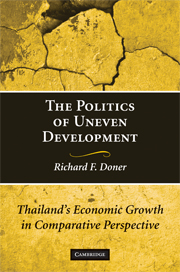Book contents
- Frontmatter
- Contents
- List of Tables and Figures
- Acknowledgments
- List of Abbreviations
- 1 The Challenge of Uneven Development
- 2 Puzzles of Thai Development in Comparative Perspective
- 3 Development Tasks, Institutions, and Politics
- 4 Origins and Consequences of Thailand's Intermediate State
- 5 Sugar
- 6 Textiles
- 7 Automobiles
- 8 Conclusion
- Appendix
- Bibliography
- Index
3 - Development Tasks, Institutions, and Politics
Published online by Cambridge University Press: 05 June 2012
- Frontmatter
- Contents
- List of Tables and Figures
- Acknowledgments
- List of Abbreviations
- 1 The Challenge of Uneven Development
- 2 Puzzles of Thai Development in Comparative Perspective
- 3 Development Tasks, Institutions, and Politics
- 4 Origins and Consequences of Thailand's Intermediate State
- 5 Sugar
- 6 Textiles
- 7 Automobiles
- 8 Conclusion
- Appendix
- Bibliography
- Index
Summary
“Uneven development” in this book refers to the fact that many middle-income, developing countries, such as Thailand, succeed at structural change but not, or much less, at upgrading. Why is upgrading rare? I contend that the tasks required for economic diversification, although difficult, are less challenging than those of upgrading. This is so in part because of potential tradeoffs among the three aspects of the latter. Increasing value added with local inputs and doing so at export levels of price, quality, and delivery require that private and public actors overcome a particularly tough set of collective action challenges. Doing so in turn requires significant institutional capacities. But politics makes such capacities rare in the developing world. The creation of institutional capacities is itself a difficult collective action problem that leaders will attempt to resolve only when facing a particularly tough set of domestic and external pressures.
I develop this framework as follows: Section I briefly reviews two approaches – developmental state analyses and new institutional economics (NIE) – whose treatments of collective action are central to my arguments. Section II presents the core of the demand-side component of my argument by identifying (1) types of difficulty along which to differentiate among policy tasks and (2) the institutional capacities appropriate for addressing those tasks. Section III applies the framework to differentiate between the tasks of structural change and upgrading and to anticipate the challenges of more specific policy tasks. Section IV addresses the question of institutional design.
- Type
- Chapter
- Information
- The Politics of Uneven DevelopmentThailand's Economic Growth in Comparative Perspective, pp. 64 - 94Publisher: Cambridge University PressPrint publication year: 2009

